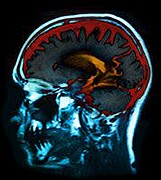- Are You Making This Expensive Thermostat Error This Winter?
- Recognizing the Signs of Hypothyroidism
- 10 Strategies to Overcome Insomnia
- Could Artificial Sweeteners Be Aging the Brain Faster?
- Techniques for Soothing Your Nervous System
- Does the Water in Your House Smell Funny? Here’s Why
- Can a Daily Dose of Apple Cider Vinegar Actually Aid Weight Loss?
- 6 Health Beverages That Can Actually Spike Your Blood Sugar
- Treatment Options for Social Anxiety Disorder
- Understanding the Connection Between Anxiety and Depression
Brain Scans Might Spot Potential for Recovery From Coma


Brain scans could help identify comatose patients who have the potential to wake up, a new study suggests.
Bedside tests are currently the standard means of trying to assess whether or not a comatose person will make some form of recovery. But up to 40 percent of patients may be misdiagnosed using these methods, experts say.
In the new study, Belgian researchers looked at 41 patients who had suffered severe brain damage and were classified as being in a vegetative state, which means that they showed no evidence of awareness or response to stimuli.
The patients underwent two types of scans: PET, with the imaging agent called fluorodeoxyglucose; and a scan called functional MRI, which tracks brain activity in real time.
The PET scan showed greater potential in distinguishing conscious versus unconscious patients, according to the study published April 15 in The Lancet. One-third of the 36 patients who had been diagnosed as “behaviorally unresponsive” using the bedside tests showed brain activity on the PET scan that was indicative of some level of consciousness, the researchers said.
The research suggests that PET scans can detect neurological processes “that aren’t visible through traditional bedside tests,” lead researcher Steven Laureys, of the University of Liege, said in a journal news release.
He added that the scan might be a valuable addition to standard behavioral tests “to identify unresponsive or ‘vegetative’ patients who have the potential for long-term recovery.”
Expert commentators agreed that new and better methods of assessing consciousness are needed.
In patients with swelling of the brain, “prediction of outcome on the basis of standard clinical examination and structural brain imaging is probably little better than flipping a coin,” Jamie Sleigh, of the University of Auckland in New Zealand, and Catherine Warnaby, of the University of Oxford in England, wrote in an accompanying journal commentary.
They said the new study “serves as a signpost for future studies” and also noted that this type of brain imaging is currently difficult and costly, “but it will almost certainly become cheaper and easier.”
More information
The U.S. National Library of Medicine has more about coma.
Source: HealthDay
Copyright © 2026 HealthDay. All rights reserved.










